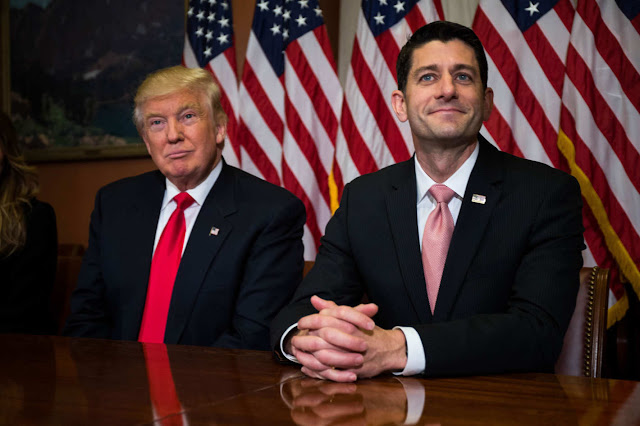Long live the Freedom Caucus
by digby
So the lesson from health care is that the White House needs to write its own legislation. What could go wrong?
President Donald Trump has scrapped the tax plan he campaigned on and is going back to the drawing board in a search for Republican consensus behind legislation to overhaul the U.S. tax system.
The administration's first attempt to write legislation is in its early stages and the White House has kept much of it under wraps. But it has already sprouted the consideration of a series of unorthodox proposals including a drastic cut to the payroll tax, aimed at appealing to Democrats.
Some view the search for new options as a result of Trump's refusal to set clear parameters for his plan and his exceedingly challenging endgame: reducing tax rates enough to spur faster growth without blowing up the budget deficit.
Administration officials say it's now unlikely that a tax overhaul will meet the August deadline set by Treasury Secretary Steve Mnuchin. But the ambitious pace to figure out a plan reflects Trump's haste to move quickly past a bruising failure to broker a compromise within his own party on how to replace the health insurance law enacted under President Barack Obama.
The White House is trying to learn the lessons from health care. Rather than accepting a bill written by the lawmakers, White House officials are taking a more active role. Administration officials have signaled that they want to pass tax legislation with only Republican votes, yet they've also held listening sessions with House Democrats.
White House aides say the goal is to cut tax rates sharply enough to improve the economic picture in depressed rural and industrial pockets of the country where many Trump voters live. But the administration so far has swatted down alternative ways for raising revenues, such as a carbon tax, to offset lower rates.
Trump, who brands himself as a deal-maker, has not said which trade-offs he might accept and he has remained noncommittal on the leading blueprint, from Rep. Kevin Brady, chairman of the Ways and Means Committee.
Brady, R-Texas, has proposed a border adjustment system, which would eliminate corporate deductions on imports, to raise $1 trillion over 10 years that could fund lower corporate tax rates.
But that possibility has rankled retailers who say it would lead to higher prices and threaten millions of jobs, while some lawmakers have worried that the system would violate World Trade Organization rules.
Brady has said he intends to amend the blueprint but has not spelled out how he would do so.
Other options are being shopped on Capitol Hill.
One circulating this past week would change the House Republican plan to eliminate much of the payroll tax and cut corporate tax rates. This would require a new dedicated funding source for Social Security.
The change, proposed by a GOP lobbyist with close ties to the Trump administration, would transform Brady's plan on imports into something closer to a value-added tax by also eliminating the deduction of labor expenses. This would bring it in line with WTO rules and generate an additional $12 trillion over 10 years, according to budget estimates. Those additional revenues could then enable the end of the 12.4 percent payroll tax, split evenly between employers and employees, that funds Social Security, while keeping the health insurance payroll tax in place.
This approach would give a worker earning $60,000 a year an additional $3,720 in take-home pay, a possible win that lawmakers could highlight back in their districts even though it would involve changing the funding mechanism for Social Security, according to the lobbyist, who asked for anonymity to discuss the proposal without disrupting early negotiations.
Although some billed this as a bipartisan solution, and President Barack Obama did temporarily cut the payroll tax after the Great Recession, others note it probably would run into firm opposition from Democrats who loathe to be seen as undermining Social Security.
This sounds like a train wreck. But I do hope they try to change Social Security in the year before an election. That will definitely work out well for them.
The level of expertise in this White House bodes really well for an overhaul of the tax code. And his vaunted negotiation skills will undoubtedly make it even better. I shudder think about what they could pass and he would sign. The most important thing is to keep the Democrats from defecting. The rest is up to the Freedom Caucus crazies. It's not much but it's all we've got.
.
